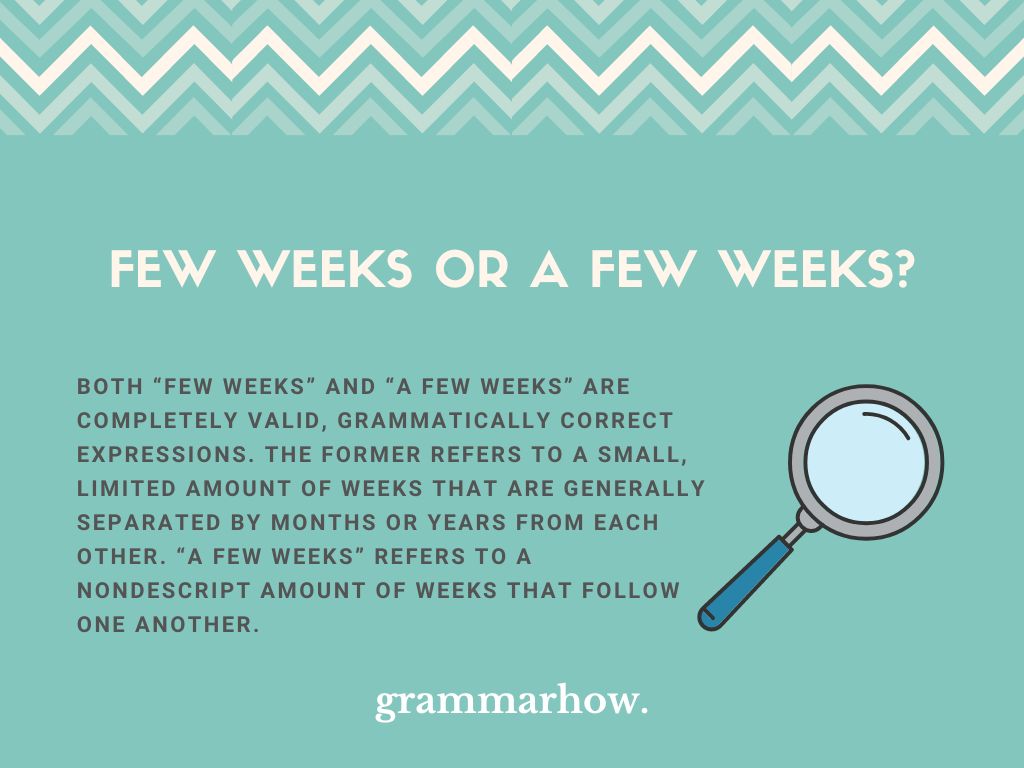Knowing how to use articles in the English language can be tricky. Depending on the word, it’s hard to know whether you should use them or not. Should you say “few weeks” or “a few weeks”? Do they mean the same thing? This article will answer these questions.
Few Weeks or A Few Weeks?
Both “few weeks” and “a few weeks” are completely valid, grammatically correct expressions. The former refers to a small, limited amount of weeks that are generally separated by months or years from each other. “A few weeks” refers to a nondescript amount of weeks that follow one another.

Therefore, both of these expressions are worth learning about, and you’d use them in separate situations. They are not synonyms of each other, and they’re not interchangeable.
It can be tricky because it can seem like they both refer to the same thing, but although the difference is small, it’s quite a significant one, and so you use the expressions differently.
Few Weeks
“Few weeks”, without any article, is an expression that is used to refer to a very small amount of weeks. You’d normally use it to imply that in only a small amount of weeks something remarkable occurs, whether it’s positive or negative.
Basically, you use “few weeks” when you want to point out that in a very tiny amount of weeks a specific thing has occurred.
Here are some example sentences showcasing the proper use of “few weeks” as an expression:
- Few weeks in my life have been as happy as these past few weeks since I met you.
- Few weeks this year have been as busy as these last two weeks, I’ve been swamped.
- Few weeks have been as interesting as these weeks that have happened since I moved here.
- Few weeks have been as hard for me, emotionally, as this one.
- Few weeks have been as fascinating and interesting as this week at the science fair.
- Few weeks have been as fun as this trip to Europe has.
A Few Weeks
“A few weeks” is an expression that talks about an indefinite and approximate amount of time, which in this case is a certain amount of weeks. “A few” specifically implies that this is a small amount of weeks, but that we’re talking about more than one or two weeks.
“A few weeks” is a useful expression to keep in mind when you want to talk about the waiting period for something, and it’s going to take a relatively short, nondescript amount of weeks.
We’ve created some example sentences that will teach you how to perfectly use “a few weeks”:
- They told me that I’ll have to wait a few weeks until my passport is ready.
- In theory, it’ll only be a few weeks until I can pick up my paperwork again.
- In a few weeks I will be done with my semester, and then we can go on vacation.
- It’s going to be a few weeks until I’m legally able to quit my job at the factory.
- A few weeks passed, and I hadn’t heard anything from her, not even a text message.
A Few Weeks Ago or Few Weeks Ago?
The correct way to phrase this expression is to say “a few weeks ago”. “Few weeks ago” is incorrect, because the article-less “few weeks” is used to talk about a number of individual instances of weeks, which is incompatible with the use of the word “ago”.
You should therefore use “a few weeks ago”, because with that phrase you’re talking about something that happened a nondescript, yet small, amount of weeks ago.
Here are a couple of examples of the correct way to use this expression:
- A few weeks ago I visited her at the old country house.
- A few weeks ago we went to the listening party for her new album.
Final Thoughts
Both “few weeks” and “a few weeks” are valid expressions, though they refer to slightly different things. “Few weeks” talks about a small number of specific weeks in your life, while “a few weeks” talks about a specific period of time that spans a small amount of weeks.

Martin holds a Master’s degree in Finance and International Business. He has six years of experience in professional communication with clients, executives, and colleagues. Furthermore, he has teaching experience from Aarhus University. Martin has been featured as an expert in communication and teaching on Forbes and Shopify. Read more about Martin here.
